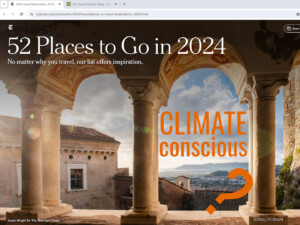Three steps travel companies can take to contend with climate change

How does one take meaningful action to back up a potentially hypocritical declaration about climate? This is a question that travel & tourism companies must contend with right now, particularly those that rely on air travel for their products and customers. Tourism scholar Francesca Gallone suggests three steps that companies can take to walk their talk and encourage others.
It’s a “Good Tourism” Insight. [You too can write a “GT” Insight.]
When it comes to decarbonising the travel industry, many companies within the sector look to the airlines to make the significant changes needed. This is unsurprising given that aviation releases more CO2 per passenger than any other mode of transport.
However, the time for waiting for change has been and gone; as has the gesture by travel companies of bolting on eco-projects to gain an ‘easy win’. Fundamental changes need to be made and they need to come from travel companies themselves.
It is estimated that by 2050, aviation will account for 22% of all global CO2 emissions.
For many years, governments and airlines have been using carbon offsetting programmes as the catch-all solution to reduce this figure; with the ICAO establishing an industry-wide scheme in 2016 that requires airlines to cancel out excess emissions that exceed the 2020 benchmark set.
However, the unprecedented decline in international travel during the COVID-19 pandemic has created a need for this benchmark to be reassessed, as it no longer reflects the targets agreed by governments in ICAO. As such, it is now recommended that 2019 emissions are used as a baseline instead.
Also see David Gillbanks’ op-ed
“Don’t panic: Opportunity, ingenuity will give us climate-friendly travel”
In any case, offsetting initiatives have been heavily contested, with environmentalists arguing that they do not address the real issue of removing CO2 from the atmosphere; that they shift the responsibly elsewhere. And there are questions over the ethics of many offsetting schemes, which have been found to displace communities, damage biodiversity, and destroy livelihoods.
Not all travellers have their eyes shut when it comes to understanding how their holidays might negatively impact the environment. Many are actively reducing the number of journeys they take each year. And some are supporting campaigns for a frequent flyer levy, or some form of taxation on the aviation sector given that it is currently provided a tax break worth millions each year.
While airlines and governments wait for the alternative fuels and technologies of the future, travel companies have not only the opportunity, but also the responsibility to lead from the front in the battle against climate change.
By following a three-step approach of commitment, education, and engagement, travel companies can become a voice of authority on climate issues, force real change within governments, and create a more sustainable future for all:
1. Commitment
Consumers want to see genuine commitment from organisations. One way to do this is for a travel company to make a promise; publicly declare the need for change and then lay out the practical ways it will effect change.
An example is Tourism Declares, a network of industry leaders who have made a public declaration of a climate emergency. In doing so they have developed a 12-month Climate Action Plan including the pledge to cut emissions.
Also see Geoffrey Lipman’s “GT” Insight
“Tourism & ‘climate emergency’: It’s the metrics, stupid”
By publishing their plans, organisations cannot hide behind tokenistic changes to make their business greener. Instead, they are bound by their public promises to ensure that fundamental changes to their operations are implemented.
Other organisations, such as 1% for the Planet, work with the travel industry to support environmental NGOs. In this example, companies commit 1% of their gross sales to support environment-saving projects.
By making public declarations and operational adaptations, an organisation demonstrates intent that goes beyond green marketing campaigns, and aligns its business model with a growing segment of socially- and environmentally-responsible travellers.
2. Education
While leading by example is a great way to demonstrate strong values and commitment to change, travel companies must also seek to educate their stakeholders to create advocates for a mindset shift towards more responsible travel.
There are numerous articles and blog posts circulating online to advise travellers on how to reduce their carbon footprint. And non-profits such as WWF are launching environmental footprint calculators to educate individuals.
Travel companies could be doing more. They can be more open and transparent with consumers about how their actions impact the environment.
Responsible Travel is leading the way in educating their customers. They are carbon-labelling their trips and designing holidays of varying carbon footprints so that individuals can make informed decisions about the trips they take.
3. Engagement
Next is the need to engage travellers to help shift attitudes and support change.
This is already being demonstrated within the industry. Examples include Explore engaging its customers to help them keep their promise to make all their trips plastic-free, and The Long Run’s call for ambassadors to join, engage in discussions, and contribute to the company’s efforts to make travel more sustainable for all.
By being open and transparent about their impacts, travel companies can work with consumers to drive change operationally, and around broader topics such as taxing airlines, reducing air travel, carbon offsetting, and encouraging meaningful trips.
Also see Tanner C Knorr’s “GT” Insight
“Climate change, COVID-19, and the need for global systemic change”
The time is now
The travel industry has reached a crossroads. On the one hand, the number of planes in the sky (pre-COVID) was dramatically increasing, with an expected 7.2 billion air passengers by 2035. On the other hand, there is a growing number of travellers who are choosing not to fly because of the guilt they feel.
However, with whole communities and countries relying on tourism for their livelihoods, we cannot afford for individuals to turn their back on international travel.
Instead, travel companies must act now to meet their commitments to travel more consciously, and work with their customers to pressure legislators to enforce tougher restrictions, taxes, and penalties on a highly polluting industry.
What do you think? Share a short anecdote or comment below. Or write a deeper “GT” Insight. The “Good Tourism” Blog welcomes diversity of opinion and perspective about travel & tourism because travel & tourism is everyone’s business.
Featured image (top of post): Contrails. How can the travel & tourism industry contend with climate change? (Image by Free-Photos (CC0) via Pixabay.)
About the author

Francesca Gallone is a Master’s student in Responsible Tourism at Leeds Beckett University in the UK, and a programme manager for a school expedition company. She also writes regularly.
A self-described “passionate voice on climate change and the future of sustainable travel” and an “avid traveller”, Ms Gallone says she is keen to engage with brands that are “helping to decarbonise the tourism industry and pave the way for sustainable, responsible travel”.





